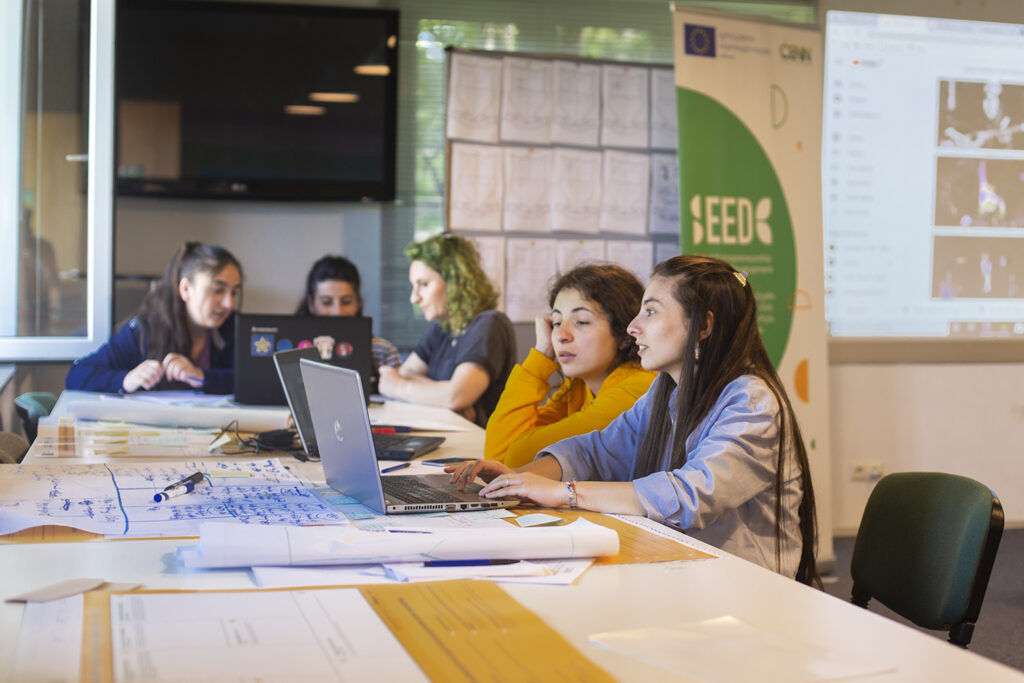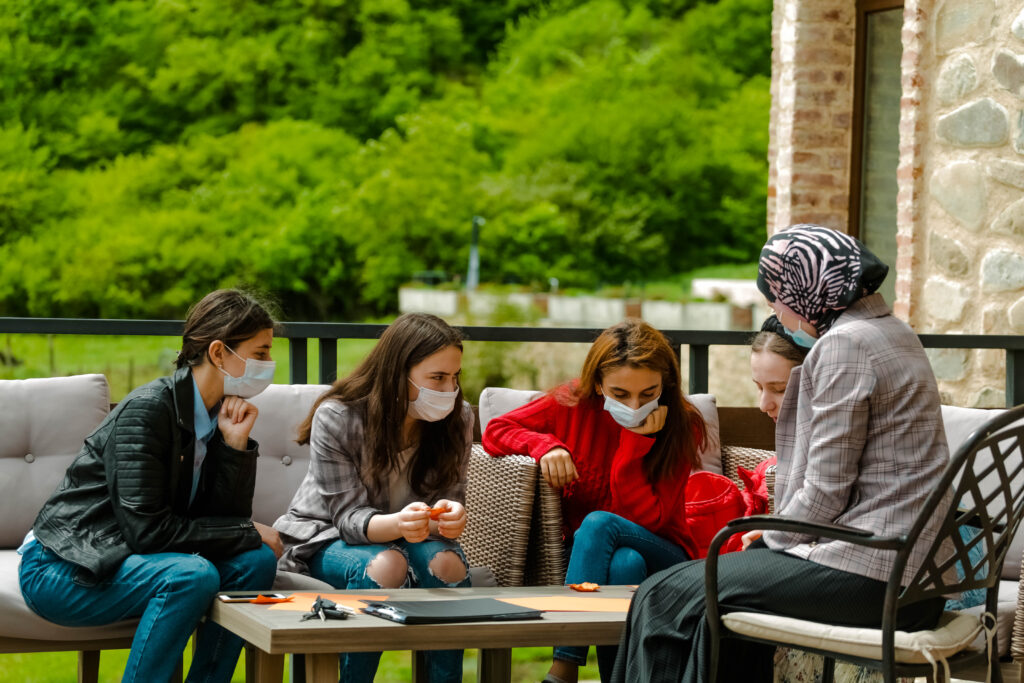Duration: 2018-2023
Geographic area: Georgia
Implemented by: CENN
Donor: Austrian Development Cooperation
Georgian forests are severely degraded due to increased human pressure and unsustainable extraction of resources and require shared efforts to enforce improved and climate resilient forest management practices. The project will work at the national and local levels and will tackle concerns faced by state and non-state actors and rural communities related to forest management and rural development.
Project Impact: To contribute to the reduction of rural poverty and delivery of commitments taken by the government of Georgia under the SDGs, NDC, and EU AA with regard to sustainable green growth.
The project aims to develop an enabling environment and effective interagency coordination for improved forest and watershed management, sustainable rural energy solutions, and diversification of rural income opportunities.
The project has the following outputs/results:
Output 1: Effective intersectoral interagency cooperation for the sustainable management of forest resources is established and functioning.
Output 2: A regulatory framework and state programs for the introduction of sustainable energy solutions are prepared and related incentives are created and tested.
Output 3: The government has the tools to support programs that will enable and expand job opportunities through the sustainable use of rural forest-related products.
Output 4: The government has developed mechanisms for addressing integrated watershed management in the forestry sector to reduce disaster risks and improve the climate resilience of local communities.
Output 5: The capacity for informed public participation and evidence-based decision-making (central and local authorities, parliament) on sustainable and efficient resource management and DRR is in place and advances the delivery of SDGs (7, 8, 12, 13, 15), NDC, and EU AA targets.
Output 6: Women’s employment opportunities are increased and their income generating ability from multifunctional forest use is enhanced (SDGs 5 and 8).

Environmental protection and natural resources management
- The SFMRD project succeeded in improving the chapter of the Forest Code on non-timber forest products. Therefore, after the approval of the Forest Code, the income generated from the production of non-timber forest products has become legal and non-timber forest resources more accessible. Therefore, all forest-related income (namely, in the NTFP sector) of small and medium entrepreneurs from target areas (as well as across the country) is now legal.
- The SFMRD project has been successful in organizing multi-stakeholder consultation meetings and establishing special platforms for improved inter-agency coordination in cooperation with MEPA and the Environmental Protection and Natural Resources Committee of the Parliament of Georgia, such as the Forest Group of Inter-Agency Coordination Council for Rural Development (FG-IACCRD), the Green Economy School, the Forestry Work Group in Parliament; along with support for the NFP platform, the SDG working group in environment and energy. Despite the challenges caused by the COVID-19 pandemic, the project team was able to establish a dialogue based on studies and expert judgment to foster political attention, state financing, and sustainability of outcomes and activity mapping for key rural development projects. As a result, the project visions were also integrated into other key strategic documents concerning sustainable forest management and rural development, such as the Rural Development Strategy (2021-2027), Rural Development Action Plan (2021-2023), Green Budget Project, and the New Forest Code.
- To support the diversification of rural economies and promote job opportunities from the sustainable use of forest resources, the SFMRD team has elaborated and provided the NFA with the “Guideline on the Identification of Touristic-Recreational Forests and Their Management in Georgia”. The Forest Governance Institutional Model and Business Plan consider the issue of managing touristic recreational forests, also elaborated by the SFMRD project. The document focuses on the development of a forest unit that is responsible for commercial forest use, which was recently established in the NFA, as per the recommendation of the aforementioned documents.
- The SFMRD project has established the Georgian Forest Product Association. The association has been actively involved in the discussion of forest resources usage regulating decrees, identified gaps, and deficiencies in the documents, and thus, benefitted more than forty members of the association involved in the production of various forest products. During the reporting period, the association worked with the MEPA and NFA to reduce the permit costs of NTFPs usage and simplify bureaucratic processes, protecting 20 companies from bankruptcy and 2,000 people from unemployment. Women are actively involved in the production of NTFPs. Namely, more than 1,000 employees of the beneficiaries of the Georgian Forest Product Association are women.
- As a result of the SFMRD project’s advocacy in regards to the gaps in the land registration practice, the Minister of Justice issued Order # 310. According to the aforementioned order, the city halls are advised not to issue the property certificates for the territories located in forest areas managed by the National Forest Agency without prior consultations with the NFA. As a follow up, during the reporting period, official letters were sent to 30 municipalities to stop the expropriation of forest land and follow the Order # 310. Moreover, after the press conference organized by the SFMRD project and partner NGOs (30 CSOs were mobilized), the Environmental Issues Committee of the Parliament of Georgia instructed to suspend all ongoing registrations. Later, a simplified rule of land registration excluding disputes without the consent of the forest management authorities was abolished.
- The SFMRD project has promoted integrated watershed management via developing evidence-based recommendations for improvements in interagency collaboration on DRR and watershed management. Namely, the SFMRD project has provided support to the Government of Georgia to develop mechanisms for addressing integrated watershed management in the forestry sector to reduce disaster risks and improve the climate resilience of local communities. Namely, apart from analysing regulatory and institutional gaps and shortcomings in the field and providing recommendations, the project has prepared 10 case study reports to demonstrate a correlation between unsustainable forest logging and natural disasters. The NFA and NEA received the case study results. Informed by the case studies, the State Audit Office has prepared a Performance Audit of Management (prevention, preparedness) of Flood Emergency, which includes findings and recommendations by the SFMRD team. The NEA has underlined that the SFMRD project has had a positive impact on filling in the gaps in the existing databases of geological processes in the forest districts.
- The CENN team has identified and mapped the hotspots in Georgian forests where logging will potentially result in natural disasters. The maps are incorporated in the updated 2020 version of the Atlas of Natural Hazards of Georgia, which is now available in both a printed and digital format.
- Moreover, two disaster risk management (DRM) plans for selected hot-spots (Kisiskhevi and Khodasheni River basins) have been elaborated in coordination with active national (state agencies, academia, universities, NGOs) stakeholders and the USFS.
- The SFMRD project has supported sustainable nature tourism through the marking and foraging of hiking trails. A hiking and mountain biking trail that meets all international standards is currently being developed in Keda municipality, Adjara. For the first time in Georgia, a bike path that meets international standards will be built in the high mountains of Adjara through the support of the Austrian Development Cooperation, the EU, and CENN in cooperation with the Tourism and Resorts Department of the Autonomous Republic of Adjara.

Renewable energy
and
energy efficiency
- In 2019, the SFMRD project team highlighted the energy pressure on forests as the main factor contributing to forest degradation in Georgia in the Climate Action Enhancement Package (CAEP). The aforementioned document proposes mitigation measures for phasing out social logging, as well as measures to support organized forest use, promote the eradication of practices concerning the unsustainable and ineffective use of forests resources, and facilitate multi-purpose forest use and interagency coordination.
- The Forest Code, which enables a forestry system that restricts excessive and illegal firewood harvesting, has moved to the implementation phase. Implementation of key decrees of the forestry sector has started via active involvement of the SFMRD project.
- Four region-specific rural energy plans following the recommendations of the feasibility study and introducing incentives promoting sustainable energy solutions have been presented and discussed among key stakeholders.
- 66 schools in Adjara’s highland municipality of Keda have been transformed into green and energy-efficient institutions. The schools consume energy through solar energy panels and reduce consumption through energy efficient stoves. Water collectors are also used to curb firewood consumption. As new green technologies are being pioneered, they will continue to be added and incorporated as necessary. The initiative has been conducted with financial support from the EU and ADC and in close cooperation with the Ministry of Education of Adjara AR.
- The SFMRD project partnered with the Government’s forestry programme (“Working Yards”), which, according to the Forest Code, will completely replace social cutting and the illegal firewood market. To this end, together with the partners, work has continued financial, technical, social, economic and business models. In this regard, it was important to use and further develop the guidance documents created under the project, such as: Forest Governance Institutional Model and Business Plan (MEPA began expanding and upscaling the aforementioned document in a participatory manner).
- Financial mechanisms for supporting the private sector were created for assisting rural development. In particular, RDA allocated grants and credits for a solid bio-energy utilization project in Mtskheta-Mtianeti (with a total budget of 2 million GEL), which, during the reporting period, was prepared and developed in cooperation with the SFMRD project.
- To support the development of alternative energy sources in Georgia, in cooperation with the National Forestry Agency, our team assisted in the installation of an autonomous solar power plant in a business yard in Bodorna, Dusheti Municipality. The power plant facilitates the efficient operation of the business yard, reduces negative environmental effects, and saves financial resources.

Enabling a business environment for an inclusive economy
- Natural cycles must continue to function, avoiding mindless waste and embracing creative ecological means. With this in mind, Georgia has been making its way towards a green economy. This process also includes initiatives to strengthen hands-on knowledge exchange and crucial forms of education. The Green Economy School initiative and the Georgian Forest Product Association both examine the ways that local communities use the forest and identify environmentally sound strategies for creating forest-related products. They encourage non-destructive, economically beneficial approaches to use forest resources. The innovative program, Green Economy School, was initiated to identify innovative and promising ideas for pilot projects. As a result of involving 5 state and private university students and community members from the target regions, as well as support from state partners (MEPA, NFA), 8 green business concepts were elaborated that focus on the sustainable consumption of forest resources and promote women’s participation (2020).
- The SFMRD project launched its first pilot project demonstrating the sustainable usage of non-timber forest resources, resulting in the creation of 60 new jobs in rural communities, of which 60% of newly employed workers are women. Namely, CENN supported the implementation of a pilot project concept “Freeze Tea” by LLC Caucasian. The concept and business model of “Freeze Tea”, which entails the production of fresh frozen bilberry tea, has received an additional 100,000 GEL grant from GITA. The project elaborated the idea and corresponding plan of the aforementioned project within the scope of our ADA-supported initiative – Green Economy School.

Strengthening
educational
systems
Since September 2018, more than 500 schools, 70 state agencies at central and local levels, and 70 non-state actors (CSOs and private companies) have been involved in an awareness raising campaign.
In order to foster the education of young people, the Niko Ketskhoveli School Award competition has been encouraging youth all around the country to take part in environmental and social activism and generate positive changes in their own communities. Every year, over 300 schools nationwide prepare to become the biggest change makers and drivers of social and environmental justice by taking part in the environmental competition. The new generation is forward thinking with a nature-based approach. They are studying and teaching the laws of nature, cleaning up polluted lands, helping the disabled in their communities, and much more.

Women Empowerment and Gender
Equality
Gender mainstreaming and women empowerment is a cross-cutting approach to all the activities within the Sustainable Forest Management for Rural Development (SFMRD) project. As part of the project, four Rural Women Councils have been established in target regions of Georgia in order to reinforce women’s and girls’ meaningful participation in forest management and rural development decision-making, as well as to create more employment opportunities for rural women through sustainable multi-functional use of forests, in particular the non-timber resources.
The women councils work on a grass root level to improve knowledge of forestry, rural energy, non-timber value chain development, forest-based tourism, and climate-resilient rural development. The rural women councils promote and showcase the sustainable use of non-timber resources of forest. Gender segregated data is gathered at all activities of the SFMRD project.
